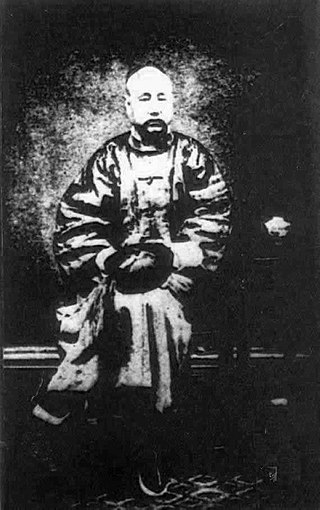This article needs additional citations for verification .(February 2024) |
| |||||
| Decades: | |||||
|---|---|---|---|---|---|
| See also: | Other events of 1865 History of China • Timeline • Years | ||||
Events from the year 1865 in China .
This article needs additional citations for verification .(February 2024) |
| |||||
| Decades: | |||||
|---|---|---|---|---|---|
| See also: | Other events of 1865 History of China • Timeline • Years | ||||
Events from the year 1865 in China .

The Taiping Rebellion, also known as the Taiping Civil War or the Taiping Revolution, was a civil war in China between the Manchu-led Qing dynasty and the Hakka-led Taiping Heavenly Kingdom. It lasted from 1850 until the fall of Tianjing in 1864, although the last rebel army was not wiped out until August 1871. The conflict resulted in approximately 20 to 30 million deaths, approximately one-twentieth to one-tenth of China's population at the time. The established Qing government won decisively, although at great cost to its fiscal and political structure.

Empress Dowager Cixi ; born Yehe Nara Xingzhen, was a Chinese noblewoman of the Manchu Yehe Nara clan who effectively controlled the Chinese government in the late Qing dynasty as empress dowager and regent for almost 50 years, from 1861 until her death in 1908. Selected as a concubine of the Xianfeng Emperor in her adolescence, she gave birth to a son, Zaichun, in 1856. After the Xianfeng Emperor's death in 1861, his five-year-old son became the Tongzhi Emperor, and Cixi assumed the role of co-empress dowager alongside Xianfeng's widow, Empress Dowager Ci'an. Cixi ousted a group of regents appointed by the late emperor and assumed the regency along with Ci'an. Cixi then consolidated control over the dynasty when she installed her nephew as the Guangxu Emperor at the death of the Tongzhi Emperor in 1875. Ci'an continued as co-regent until her death in 1881.

The Xianfeng Emperor, also known by his temple name Emperor Wenzong of Qing, personal name Yizhu, was the eighth emperor of the Qing dynasty, and the seventh Qing emperor to rule over China proper, reigned from 1850 to 1861. During his reign, the Qing dynasty experienced several wars and rebellions including the Taiping Rebellion, Nian Rebellion, and Second Opium War. He was the last Chinese emperor to exercise sole power.

Yixin, better known in English as Prince Kung or Gong, was an imperial prince of the Aisin Gioro clan and an important statesman of the Manchu-led Qing dynasty in China. He was a regent of the empire from 1861 to 1865 and wielded great influence at other times as well.

The Nian Rebellion was an armed uprising that took place in northern China from 1851 to 1868, contemporaneously with the Taiping Rebellion (1850–1864) in Southern China. Ultimately the rebellion failed to topple the Qing dynasty, but caused immense economic devastation and loss of life that became major long-term factors in the collapse of the Qing regime in the early 20th century.

Zhang Lexing was a Chinese guerrilla leader during the Nian Rebellion in China.

Sengge Rinchen or Senggelinqin was a Mongol nobleman and general who served under the Qing dynasty during the reigns of the Daoguang, Xianfeng and Tongzhi emperors. He is best known for his role at the Battle of Taku Forts and at the Battle of Baliqiao during the Second Opium War and his contributions in helping the Qing Empire suppress the Taiping and Nian rebellions.
Lai Wenguang, born in Mei County, Guangdong, and later worked in Guangxi, was an eminent military leader of the Taiping Rebellion and Nian Rebellion, and known during his military tenure as the King of Zun (遵王). He served under Hong Xiuquan's Taiping Administration, and was Hong Xiuquan's wife young brother. He led Taiping forces to many military victories. Lai became the leader of Eastern Nian Army in 1866. In June 1865, he commanded Nian cavalry forces of 90,000 in surrounding and attacking the capital Beijing, nearly successfully. Lai surrendered to Qing forces on January 5, 1868. He was executed by Li Hongzhang after interrogation in February.
Events from the year 1875 in China.
Events from the year 1860 in China.
Events from the year 1861 in China.
Events from the year 1857 in China.
Events from the year 1856 in China.
Events from the year 1862 in China.
Events from the year 1863 in China.
Events from the year 1864 in China.
Events from the year 1866 in China.
Events from the year 1867 in China.
Zhang Zongyu was a commander of the Nian Rebellion. He was the nephew of Nian leader Zhang Lexing who was killed by Qing forces in battle in 1863. Taking over command after his uncle's death, Qing commander Sengge Rinchen pursued Zhang's forces to the city of Caozhou, Shandong. However Senge Rinchen was killed in early 1865, allowing Nian troops to retreat to northern Anhui. In October 1866 Zhang returned to Shandong with reinforcements, among them former Taiping rebels. At this point the Nian army became a full-name army.